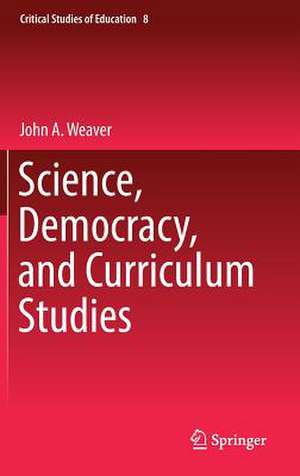Science, Democracy, and Curriculum Studies: Critical Studies of Education, cartea 8
Autor John A. Weaveren Limba Engleză Hardback – 14 sep 2018
In this book John A. Weaver suggests curriculum studies scholars need to engage more in science matters. It offers a review of science studies writing from Ludwick Fleck and Thomas Kuhn to Philip Mirowski. The volume includes chapters on the rhetoric of science with a focus on the history of rhetoric and economics then on the rhetoric of models, statistics, and data, a critique of neoliberalism and its impact on science policy and the foundations of democracy, Harry Collin’s and Robert Evans’ theory of expertise followed by chapters on feminism with a focus on the work of Sharon Traweek, Karen Barad, and Vinciane Despret, postcolonial thought, with attention paid to the work of Daniela Bleichmar, Londa Schiebinger, Judith Carney, Sylvia Wynter, Paul Gilroy, and Sandra Harding, and a final chapter on Nietzsche’s philosophy of science. Each section is introduced by an interlude drawing on autobiographical connections between curriculum studies and science studies.
| Toate formatele și edițiile | Preț | Express |
|---|---|---|
| Paperback (1) | 359.16 lei 38-44 zile | |
| Springer International Publishing – 13 dec 2018 | 359.16 lei 38-44 zile | |
| Hardback (1) | 390.63 lei 6-8 săpt. | |
| Springer International Publishing – 14 sep 2018 | 390.63 lei 6-8 săpt. |
Din seria Critical Studies of Education
- 24%
 Preț: 575.44 lei
Preț: 575.44 lei - 15%
 Preț: 642.03 lei
Preț: 642.03 lei -
 Preț: 392.37 lei
Preț: 392.37 lei - 18%
 Preț: 787.91 lei
Preț: 787.91 lei - 18%
 Preț: 998.51 lei
Preț: 998.51 lei - 18%
 Preț: 1002.31 lei
Preț: 1002.31 lei - 18%
 Preț: 892.74 lei
Preț: 892.74 lei - 15%
 Preț: 635.15 lei
Preț: 635.15 lei - 18%
 Preț: 723.24 lei
Preț: 723.24 lei - 18%
 Preț: 778.45 lei
Preț: 778.45 lei - 15%
 Preț: 639.90 lei
Preț: 639.90 lei - 15%
 Preț: 643.84 lei
Preț: 643.84 lei - 18%
 Preț: 730.47 lei
Preț: 730.47 lei -
 Preț: 389.49 lei
Preț: 389.49 lei -
 Preț: 389.11 lei
Preț: 389.11 lei - 18%
 Preț: 727.66 lei
Preț: 727.66 lei
Preț: 390.63 lei
Nou
Puncte Express: 586
Preț estimativ în valută:
74.75€ • 78.26$ • 61.100£
74.75€ • 78.26$ • 61.100£
Carte tipărită la comandă
Livrare economică 09-23 aprilie
Preluare comenzi: 021 569.72.76
Specificații
ISBN-13: 9783319938394
ISBN-10: 3319938398
Pagini: 195
Ilustrații: XI, 198 p. 1 illus.
Dimensiuni: 155 x 235 mm
Greutate: 0.48 kg
Ediția:1st ed. 2018
Editura: Springer International Publishing
Colecția Springer
Seria Critical Studies of Education
Locul publicării:Cham, Switzerland
ISBN-10: 3319938398
Pagini: 195
Ilustrații: XI, 198 p. 1 illus.
Dimensiuni: 155 x 235 mm
Greutate: 0.48 kg
Ediția:1st ed. 2018
Editura: Springer International Publishing
Colecția Springer
Seria Critical Studies of Education
Locul publicării:Cham, Switzerland
Cuprins
Chapter One Introduction: Science, Democracy, and Curriculum Studies: Why (Not) Science Matters?.- Chapter Two From Kuhn to the Economics of Science: Curriculum Studies and Science Studies.- Chapter Three Homo Economicus, Rhetoric, and Curriculum Studies.- Chapter Four Observing Economics: The Rhetoric of Data, Models, and Statistics.- Chapter Five The Economics of Science, Neoliberal thought, and the Loss of Democracy.- Chapter Six (Post)Colonial Science.- Chapter Seven Working Our Way Back: Colonial Science in light of Postcolonial Thought.- Chapter Eight Of Hierarchies, Cultures of no Culture, Ontology, Protocols, and Anecdotes: (Re-Writing).- Chapter Nine Nietzsche’s Science.
Textul de pe ultima copertă
In this book John A. Weaver suggests curriculum studies scholars need to engage more in science matters. It offers a review of science studies writing from Ludwick Fleck and Thomas Kuhn to Philip Mirowski. The volume includes chapters on the rhetoric of science with a focus on the history of rhetoric and economics then on the rhetoric of models, statistics, and data, a critique of neoliberalism and its impact on science policy and the foundations of democracy, Harry Collin’s and Robert Evans’ theory of expertise followed by chapters on feminism with a focus on the work of Sharon Traweek, Karen Barad, and Vinciane Despret, postcolonial thought, with attention paid to the work of Daniela Bleichmar, Londa Schiebinger, Judith Carney, Sylvia Wynter, Paul Gilroy, and Sandra Harding, and a final chapter on Nietzsche’s philosophy of science. Each section is introduced by an interlude drawing on autobiographical connections between curriculum studies and science studies.
Science, Democracy, and Curriculum Studies is imaginative and virtuosic, narrated by John Weaver's pedagogical voice that does not hide behind pretenses. The argument for curriculum scholars and educationalists to attend to the questions of science is pitched as a loving plea. Taking a humanities-based approach, with influences ranging from Augustine to Karen Barad, science is neither dismissed as "fake" nor given a supernatural claim to autarky. Weaver's rich and varied content is arranged and composed with keen attention to form, surrounded by interludes and even aphorisms. It is a refreshing book where facile divisions are destroyed and reimagined.
Sam Rocha, University of British Columbia
Assistant Professor, Philosophy of Education
Sam Rocha, University of British Columbia
Assistant Professor, Philosophy of Education
Caracteristici
Makes the case for curriculum studies scholars to consider science matters Demonstrates the ways science matters and curriculum studies intersect Shows how science is a necessary component for a vibrant democracy
